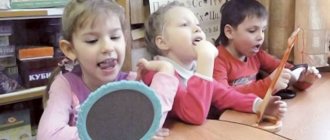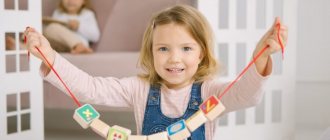Every mother eagerly dreams of hearing the cherished word mom from her baby. Babies already speak syllables like “ma”, “pa”, “ba” at the age of six months. However, they pronounce such words unconsciously. The baby likes to repeat the same stretching syllables one after another. But when does a child start talking to mom meaningfully?
It depends on the development and characteristics of each baby. As a rule, babies utter their first conscious light words after nine to ten months. By the way, the first word a child consciously utters may not be “mom” at all. In this article we will look in detail at how many months a child begins to speak consciously. And we’ll find out how to teach a child to say mom.
A child's first words
First, the baby imitates, repeating various syllables after adults and sounds after animals. By repeating syllables several times in a row, complete words are formed. However, as we have already said, he pronounces such words unconsciously. After six months he listens and begins to understand adults. Thus, the infant’s passive vocabulary is formed.
Children begin to speak meaningfully by the age of one year. And here an already functioning active vocabulary is formed, when the baby not only understands what adults are telling him. But he also understands words that he understands himself. By the age of one year, the baby’s vocabulary is about ten words; by six months it expands to 15-20.
As a rule, kids begin to understand and say the word give faster, rather than mom and dad. Judging by the statistics, more than half of these children are. The baby happily repeats the sounds of animals, especially if the family has pets. By six months, he can be able to meow, bark and even growl. At the same time, he not only repeats sounds, but also imitates intonation.
A child begins to learn speech from the first days of life. He hears different sounds and speech of adults. Adaptation to the surrounding sound world occurs. Soon the child should learn to distinguish the faces and voices of loved ones who spend a lot of time with the baby. Of course, first of all, this is mom.
Mommy's voice stands out among others. The child quickly grasps its sound. Therefore, it is the mother who should communicate more often and longer than others with her baby and constantly talk to him. Active communication will help master speech, and soon the baby will be able to pronounce the first conscious word.
All babies are different
Very often, parents compare their baby with other children. They are scared and hurt by their pride when someone turns out to be better and knows more. They start trying to teach the baby to pronounce a word, and get angry if he doesn’t succeed. This is a wrong and harmful practice.
The fact is that you cannot teach to speak; mastering speech is a very complex mental process. But you can develop the baby, because children learn about the world through their parents, communication with them, classes, reading books, games. It doesn't really matter when they say a certain word. The main task of parents is to teach their children to understand what they want from them and to expand their vocabulary.
Child speech development
| Age | Characteristics | What does the baby say |
| 1 month | The child communicates by shouting; by the end of the month he will begin to listen to surrounding sounds and respond to speech that is addressed to him | Vowel sounds and combinations, such as a-a, o-o, u-u, u-a, etc. |
| 2-3 months | Sounds acquire emotional overtones; by the end of the third month the baby will begin to gurgle and coo; new intonations appear, the baby waits for a response | Chants vowel and consonant sounds, such as a-a, a-gi, a-gu |
| 3-5 months | Humming is actively developing; the child begins to babble and speak the first syllables; the need to communicate with adults increases; The baby gradually masters the consonants g, k, x, b and p | Various sounds and combinations in different orders, such as ga, gu, agu, agi |
| 6 months | Begins to repeat syllables and understand the speech of adults, which forms the passive vocabulary of children; easily recognizes relatives and friends; babbling is similar to real words, but they are not yet conscious, but are onomatopoeia | Repeats and pronounces chains of syllables, such as ma-ma, pa-pa, ba-ba |
| 7-8 months | The child responds to his name, can change the timbre and volume of his voice, and forms a passive vocabulary; the formation of an active vocabulary begins; the baby understands phrases addressed to him | Pulls out sounds and alternates high notes, imitates animal sounds, such as meow-meow, woof-woof, muuuu, etc. |
| 9-10 months | Masters new sounds and begins to speak the first easy words; speaks gestures, incl. nods his head, waves, points his finger at a person or thing | Clearly pronounces the syllables la-la-la, ta-ta, etc.; pronounces up to 10 monosyllabic imitations of sounds |
| 11-12 months | Begins to consciously speak light words; he understands speech addressed to him, shows parts of the body and face, familiar animals and people | He speaks easy words, including mom, dad, grandpa, grandma, etc. |
| 1-1.3 years | By the first year of life, the baby’s active vocabulary numbers about ten words; at 1.3 years it expands to 15 words | Pronounces and understands easy words (mom, dad, etc.), names of toys, processes and familiar names |
| 1.5 years | The baby knows about twenty words and begins to form two-word phrases; The first verbs appear in the child’s speech, but he still incorrectly uses the genders of nouns, adjectives, and pronouns | Says light words and phrases, such as give me, take a toy, gray bunny, bear fell, etc. |
| 2-3 years | The child knows about 50 words, composes phrases and sentences, changes words according to cases and numbers; remembers short poems and nursery rhymes; the baby fully understands the adult’s speech and can fulfill a double request (take the toy and give it to me) | Makes up phrases and light sentences, pronounces his actions and desires, for example, I went for a walk, I eat porridge, I want to play, etc. |
How to help your baby speak faster
With the right support, every person is capable of much in their life. Good, well-delivered speech will need to be learned, but unwavering positivity and faith will help your child overcome all difficulties faster!
Exercises
So you can:
- Make time for reading. Take a book from the shelf with a short story and bright illustrations and spend the evening in the company of your child! Don’t be afraid to repeat the same text several times, because it is this approach that will allow words and expressions to become firmly entrenched in memory.
- Play songs and fun music. To improve hearing and word perception, a child needs to hear music in the house more often. Try to include more active and melodic compositions, while simultaneously developing auditory-motor coordination.
- Actively comment on your actions. Find a middle ground so you have time to listen to your baby and also tell him about everyday activities. Talk to him about everything, from important events to cooking dinner.
- Use simple and short phrases . Children learn from adults, carefully copying their actions. When you actively gesture, you teach your child to better understand the meaning of words. But do not forget also that it will be difficult for the baby to delve into long phrases, so at first it is better to limit yourself to something simple, for example, “bring a toy,” “sit down at the table,” and so on.
Maybe,
How to teach a child to consciously say mom and other words
- Accompany every action with the word mom. For example, mom has come, mom is feeding Seryozha (child’s name), mom is tired, mom is cooking porridge, etc.;
- Play the game “Where is Mom?” Cover your face with your hands and ask the child where mom is. After six months, the baby easily understands such questions and even points his finger at the right person or object;
- When you stroke a child’s head, say that a mother is stroking her daughter or son;
- Use various games and exercises to develop speech and fine motor skills. With children over two years old, you can start reading, learning and memorizing small, short poems. Articulation gymnastics and games of frets with nursery rhymes help a lot;
- When the child says a word consciously, repeat this word after him and praise him;
- Evaluate and encourage any progress in your baby's speech. Praise is the best incentive for development;
- To teach a child, when talking to him, look the baby straight in the eyes;
- To help your baby quickly learn to say a certain word, repeat it more often;
- Using the recommendations listed above, you can also teach your child to say words such as dad, grandpa, grandma, uncle, aunt, and so on. To do this, in your family, try to call each other in the third person. For example, dad came; grandpa, grandma, let's go eat and so on;
- To ensure the correct and full development of the baby, do a regular massage and regularly perform water procedures, engage in sports and physical exercises with your baby. How to massage a baby, see here.
Why are children now learning skills late?
There may be several reasons why many parents are forced to turn to a speech therapist. The main ones are:
- Indifferent attitude of adults to the problem. Leaving everything to chance is very risky. Parents should remember that hoping to overcome speech defects on their own may be worth long and expensive work with a specialist.
- Ecological situation. Polluted air and exhaust gases can significantly slow down a baby's development. As a result, you need to carefully monitor your diet, actively exercise, and take vitamins and minerals after consulting your doctor.
- C-section. Of course, many children are born in this way. And although experts do not observe dangerous pathologies, it is important to be prepared for the fact that children’s development may be hampered.
If the child does not speak
Each baby has its own development path. It depends on heredity, temperament and character, gender, developmental conditions and environment, daily routine and even nutrition. Some children start speaking later than others, and there is nothing wrong with that. This behavior is often typical for calm and phlegmatic children.
Experts note that boys, on average, begin to speak one to two months later than girls, but then catch up in a short time. In a bilingual environment, when two or more languages are spoken in the family, it is more difficult for the baby to perceive information, so he may start speaking later. In addition, the development of speech is negatively affected by a monotonous environment and insufficient communication with people. With a lack of communication and fresh impressions, the baby simply has nothing to talk about.
A serious reason for this behavior is stress, lack of emotional contact with parents and various psychological problems. If a child rarely sees and communicates with his mother, this negatively affects the emotional state and psychological development of the baby. Young children acutely feel tension and conflicts in the family. This also negatively affects the development and well-being of the baby.
The most serious causes are severe speech disorders, including aphasia, dysarthria, sensory and motor alalia. Medical problems include congenital anomalies and anomalies of intrauterine development, genetic diseases, and deafness. Such diseases require professional intervention and monitoring.
Are there differences between boys and girls
It is generally accepted that girls start speaking earlier.
This is due to the fact that they are most often calmer and unemotional, and there is no particular need for outside help.
Such children will quietly babble to themselves during an interesting activity, therefore, speech will develop earlier.
On the contrary, boys are more hot-tempered and noisy; in the early stages of growing up, they are characterized by loud screams, squeals and sudden movements.
Thus, by adhering to a more non-verbal way of expressing thoughts, their speech may be delayed.
Also, according to some studies, girls have a fairly plastic nervous system, thanks to which it is much easier for them to develop.
When to sound the alarm
- In the first months of life, the baby does not cry;
- At four to five months, the child does not gurgle, does not react to the appearance of his mother with animation or a smile;
- The baby does not listen to sounds;
- At seven to nine months, the child does not recognize the voices of his family, does not babble or repeat sounds or syllables;
- At one year old, the baby does not utter a single word and does not understand speech addressed to him;
- At 1.5 years old, the baby does not speak simplified and easy words, does not respond to comments and requests;
- At two years old, the child does not speak or speech is indistinguishable, the baby cannot fulfill the request.
If you notice such deviations in the development of your child, be sure to consult a doctor.
It is necessary to check the hearing and the degree of development of mental functions and skills. Visit a pediatric neurologist and otolaryngologist, speech therapist and psychologist. For a detailed calendar of child development by month, what and when a baby should be able to do, see the link. Subscribe to our VKontakte group
School age
If before this age it was not possible to get rid of the habit of foul language, then the child will learn to control it and adapt it to the society in which he finds himself.
At home he will stop swearing, but in yard games he may well fight and swear, “while his parents are not looking.” Appearing like an adult among peers is a common way of asserting oneself.
You can show your preschooler other ways to be an adult: controlling expenses, helping around the house, participating in decision-making, the right to make independent choices (furniture, colors, holiday gifts). Conversations, therapeutic tales, working with a psychologist, changing the environment - all means can be used. But the best of them is your own example.
Let dad “give up” swearing with his son on the terms of competition. Or eavesdrop on your child’s street dialogue, and in the evening at dinner respond without hints: “One of the kids swore so terribly today when you were playing! I heard it by chance and thought: “It’s so good that our boy doesn’t know such words!” With conscientious children, this technique almost always works.
The desire to attract attention through “hate”
Preschoolers, especially those aged 4–5 years, do not fully understand the difference between good and bad words. They can use the latter unconsciously: the reaction of others is significant to them. Perhaps the baby said, “I hate putting on a hat,” but the adults were very touched by this and began to smile. Naturally, this is deposited in the child’s head
And the next time the baby uses the same technique to attract attention, the word becomes a habit
Often adults are touched when a child utters unusual words, thereby provoking him to continue repeating them
How to react
There is no need to be touched when a child says such phrases. Perhaps he will say this only once and quickly forget. If this does not happen, you already need to talk with the baby, look for reasons for repeating unnecessary words.
At what age should you start classes to develop the articulatory apparatus?
By about a year, as soon as the child is ready to listen, understand and follow instructions, speech therapy games can begin with him.
With their help, little girls and boys will not only strengthen their emotional connection with adults, but also prepare their speech apparatus for the correct pronunciation of sounds. Articulation games for little ones:
- antics in front of the mirror. Helps you study yourself, your face, your movements and makes all facial muscles work;
- tongue movements imitating licking lips. They hone their language skills to produce more complex sounds;
- puffing out the cheeks;
- tongue stretching;
- training speech exhalation by blowing soap bubbles, blowing light objects off the table, etc.
The main rule when working with children is a good mood and approval from an adult.
Booming
The humming occurs around 1-2 months and lasts for about six months. As a rule, these are different variants of sounds: gee-s, agu-u, ge-e, agy-s, etc. Gradually, the baby’s “lexicon” is enriched with new intonations and sounds, the humming becomes meaningful and more active when people appear next to him , with whom you can “chat”.
If you look closely, you will notice that a child aged 3-4 months looks into your eyes while walking, as if trying to build a full-fledged dialogue. He learns to coordinate his voice and gaze, which in the future will become the basis of any contact with people.
Be sure to respond to your child and encourage his first “performances.” Look how he reaches out and tries to purse his tiny lips the way you do in order to give you a decent answer!
Yes, your little speaker is already imitating you and listening to what sounds he makes in order to repeat them most accurately. But for now, what is important for the baby is not the meaning of the words, but the rhythm of speech, the articulation of sounds, and various intonations. He studies all this intensively.
The world is beautiful
The most important moment comes when the little person is already following his mother with his eyes. No parent will doubt that the baby has begun to recognize him. Although vision is formed during pregnancy, in a newborn it has limited capabilities that develop gradually.
Many people are concerned about the question: “How many months must pass before the mother begins to be visually recognized?” To do this, you can compare some data. Age is given in months.
First second
Ability to briefly focus attention on large, close objects. The world is seen in black and white.
Third
The gaze focuses on both near and distant objects. People have different facial features and bright colors (especially red and yellow). Binocular vision is finally formed - two eyes see simultaneously.
Third fourth. Recognizing parents by their faces.
Fourth fifth. Interest in moving objects. Tracking them.
Fifth - sixth. The ability to distinguish basic colors and shapes, emotions and moods of others.
Seventh - ninth. Identification of features of objects by shape, color, size.
Eighth - tenth. Recognizing people who are often in the house.
After this age threshold, children clearly draw the line between “friend and stranger.” And the smile of a stranger can be answered with loud crying.









